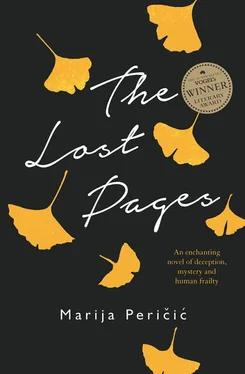My mother and I stayed in the nearest village for some days, but the details of the place have been lost from my memory. I only remember that my mother’s sadness seemed to intensify during this time. She was also excessively gentle and permissive with me. She allowed me to choose the food I would eat, and did not insist that I rise from bed at a particular hour. Although this pleased me at first—normally I only received these privileges when it was my birthday, or some special occasion—as day followed day, these unaccustomed freedoms began to make me uneasy.
I remember clearly our second visit to the house of the shoemaker. My mother was very agitated on the journey and told me that the man had built something very special for me to make me well. Since she had mentioned tailors to me before I imagined that this would be some item of clothing, like one of the magic cloaks that I had read about in my books of fairy tales at home. The shoemaker’s house seemed less sinister to me as we approached it, now that I could associate him with the wise men and women of the stories. I became quite excited and forgot my apprehension of recent days.
The man stood me once again on the pedestal and I eagerly looked around the room for my magic garment, but there were no bolts of cloth to be seen. Neither were there any rows of coloured cotton on long stands as there were at the tailor’s shop. The shoemaker left the room and I imagined the moment that I would be dressed in the cloak. I wondered what magic powers the cloak would give me, and worked myself up into quite a state of nervous expectation.
At last the shoemaker returned. In his hands he held not a cloak, but a kind of skeleton made of wood and metal with leather straps hanging off it and a canvas middle section. It looked a bit like the harnesses used for horses, but much smaller. He approached me with it and, like a young untrained horse, I shied away when he tried to place it on me. Even my mother’s words could not soothe me this time and I dodged the shoemaker and tried to run out of the room, but he caught me in his arms and lifted me back onto the pedestal—patiently at first, but after a few attempted escapes he grasped hold of me roughly and shoved me onto the hard ground, holding me down and forcing the harness over my head. I struggled and tried to fight him with my fists, but it was like hurling myself against a great tree. I was soon totally exhausted and lay back, limp, on the dirty stone floor. The shoemaker picked me up again and placed me on the pedestal, and this time I did not resist and just stood slack and still. He adjusted straps here and there and turned me about.
The harness had two curved pieces of wood that hooked under my armpits, and from which two flat metal bars ran in a vertical line down my ribs to my hips on either side. A further two rods reinforced the back of the harness. Two leather straps like stirrup leathers on a saddle were fastened in a crossed fashion over my shoulders onto the front of the two wooden hooks. This wood and metal structure was lined with canvas in the shape of a tight vest. It was uncomfortable enough with the straps unfastened, heavy and thick. When the straps were tightened, it was almost unbearable. My crooked torso did not fit the shape of the straight metal reinforcing rods and, although they were slightly flexible, they strained against my flesh and threw me off balance. I looked at my mother and saw that she was crying. The shoemaker lifted me down from the platform and I waited for him to undo the straps again, but he did not. I wore that harness for the next year of my life for every hour of the day, except when washing. It was impossible to sleep the first few weeks. I would lie in every position I could think of and secretly loosen the shoulder straps, but to little effect; for that whole year I felt I was living in the grip of a vice, where I had to strain to take every breath.
Each time I had a bath my mother would come and examine me to try to find signs of my body straightening, but even after some months had passed the only visible effect the harness had on my body were several permanent open sores under my arms and on various points of my torso, where the metal bands pushed against my soft skin, and two deep grooves on the tops of my shoulders from the straps, which I still carry on my body today.
Lying there in my bed, I could feel again the leather straps and metal rods tighten around me, cutting into my flesh. I touched the deep runnels on my shoulders. Reading about Gregor was about as unnerving as hearing another person speak with my voice. I read and reread the opening sequence and felt a sense of vertigo, as though my fever had returned.
It occurred to me that I was Gregor; I was the model for him. I must be. That Franz, all the time we had been together, had been silently observing me as though I were some rare specimen, storing up impressions and noting them down to imprison me in his story like pinning an insect to a card. The more I read, the more convinced I became that this was the case, and that Gregor was a thinly veiled version of me.
I felt terribly ashamed, as if I had been paraded naked down the Wenzelsplatz in the middle of the day, with every one of my flaws and faults visible to all. I quite literally felt that I wanted to die. I threw the manuscript into the corner of the room and it landed with its pages splayed out, flower-like, over the carpet. I fell back onto the bed. I felt too ill to get up and go out, but too well to sleep in the middle of the day. I expected to lie there in agony for hours but instead I immediately fell into a deep sleep.
I dreamed that I had woken in my own bed. Everything in the room looked exactly the same as it had earlier, except now it was night-time, which made it difficult to tell if I dreamed or was awake. I looked over to where I had thrown the manuscript, but it was gone. I heard a shuffling sound and a white shape like an enormous flat spider scuttled out from under the bed and ran under the sofa. Its many-legged, jerky gait made me nauseous and light-headed. I got out of bed and picked up one of my shoes, Silently in my bare feet, with my knees bent for stealth, I tiptoed very slowly across the room. I brought the shoe up over my head, ready to strike.
Holding my breath, I bent down to look under the sofa. The creature was huddled there against the wall. It looked like it was made of paper. I reached my hand with the shoe under the sofa to chase it out, but it flattened itself onto the floor and the shoe passed harmlessly over the top of it. As I withdrew the shoe and was standing up again, considering what to do next, the creature dashed out from under the sofa straight at my bare ankles. It flew against me with angry rustles, the edges of the paper cutting and cutting my flesh. It wrapped its pages around my ankles like the tentacles of an octopus, hobbling my legs together.
I screamed and began swiping at my legs and jumping from foot to foot, trying to dislodge it. The touch of the thing against my skin disgusted me and worried me much more than the streaks of blood that were running over my feet and onto the carpet. I raised the shoe over my head and brought it down on the creature with a crunch, dislodging a few pages. I beat and beat at it until it was a torn lump of pulpy pages scattered on the floor.
I awoke with a sense of triumph. It was night-time and I could see the whitish glow of the manuscript in the corner where I had thrown it. It was only a manuscript: perhaps it was the only manuscript, the only copy. Was this likely? I did not know if Franz made carbon copies or had arranged for the novel to be copied before passing it to me.
I revisited the satisfaction of my dream, the feeling of beating the bundle of papers to a pulp, then began to fantasise about different ways I could destroy the manuscript. I could throw it in the fire, using the poker to break up the last remnants of paper into the finest powder. I could shred it into pieces as small as snowflakes and cast them over the Moldau. Or I could drown it in water and then mash the pages into a papier-mâché ball, which I would then mould into the sculpture of a man’s head and display on a shelf.
Читать дальше













